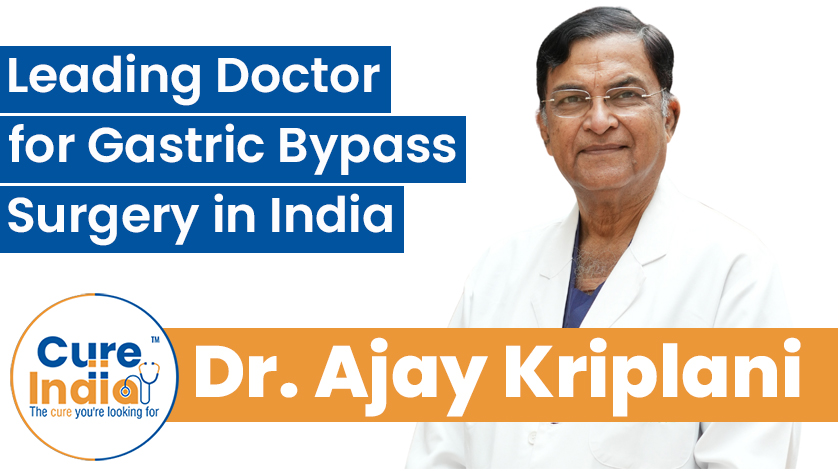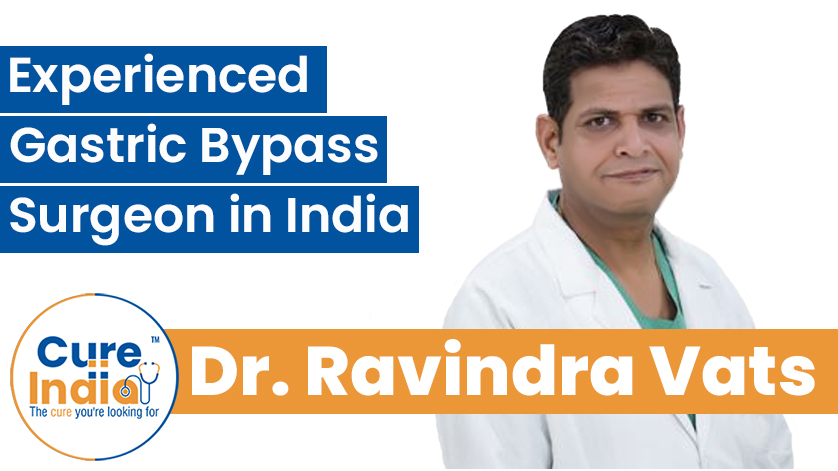

A gastric bypass surgery is one of the most common bariatric surgeries. It is also known as Roux-en-Y gastric bypass surgery because it involves dividing the stomach and small intestine and connecting the new segments together, which forms a Y shape. It is also commonly known as bariatric bypass surgery and stomach bypass surgery. The main purpose of the gastric bypass surgery procedure is to reduce the amount of calories that your body consumes from the food. This is achieved by dividing the stomach and small intestine into two parts and then connecting the top stomach part to the bottom intestine part. Now the food you eat will bypass the bottom stomach part and top small intestine part and directly pass from the small pouch of the stomach (top part), which will be of the size of an egg or walnut, to the bottom portion of the small intestine known as the jejunum. As a result, the stomach is reduced in size, so you will feel full after eating only a little food and easily avoid overeating, and the surface area for calorie absorption in the small intestine is also reduced. Hence, the total calories that your body absorbs from the food you eat will significantly reduce. This procedure is most commonly used for people struggling with obesity and other diseases caused by obesity and who are unable to reduce their body weight by dieting and exercising.
A study conducted by the World Obesity Federation has predicted that the prevalence of obesity among adults and children will rapidly rise between 2020 to 2035, especially in the global southern regions like Africa. Another study that was conducted by the World Obesity Atlas 2023 has predicted that the prevalence of obesity in children will increase by 14% and the prevalence of obesity in women will rise to 31% in Africa. The yearly increase in obesity among children in African countries is highest in Angola (8.5), followed by Rwanda, Uganda, and Tanzania (8.4). It also proves that obesity rates are continuously rising in low and low-middle-income countries and are highest in Africa and Asia, and they will continue to rise if action is not taken. According to the World Health Organisation, the diets and lifestyles in Africa are dramatically changing, and the people in Africa are becoming sedentary in addition to increased consumption of soft drinks, calorific, and processed food, which is causing the rise in obesity rates. Due to the unavailability and expensive treatment procedures, many people from African countries visit India to have various treatment procedures done by the best Indian gastric bypass surgeons, one of them being gastric bypass procedures.

It is also known as sleeve gastrectomy. This procedure involves removing about 80% of the stomach and leaving only a small portion that looks like a sleeve. By doing so, the amount of food that you consume will reduce significantly, and you will feel fuller with only a little food.
This type of gastric bypass surgery involves dividing the stomach and small intestine into two parts and connecting the upper stomach part with the lower small intestine part. The upper intestine part is then connected to the site where the upper stomach and lower small intestinal part are connected.
It is also known as a gastric reduction duodenal switch. It is a combination of sleeve gastrectomy and intestinal bypass. In this procedure, about 75% of the small intestine is bypassed. This method is proven to improve metabolic syndromes such as diabetes.
It is also known as a loop duodenal switch (SADI-s). In this procedure, about 50% of the small intestine is bypassed, and the stomach size is also reduced. The small intestine is attached by forming a loop, and hence, only one connection is required.
The main reason to have gastric bypass sleeve surgery is to get rid of obesity by managing the caloric intake of your body. This surgery is for people suffering from chronic obesity and other medical conditions caused by obesity and who can’t lose weight with traditional methods. A gastric bypass surgery procedure can improve the following medical conditions:





The gastric bypass sleeve cost varies in different cities and hospitals. It also depends on the patient’s health, age, overall fitness, and other factors like insurance coverage, travel costs, surgeon’s fees, medicine costs, stay costs, etc. However, on average, the gastric bypass surgery price in India ranges from 5262.13 USD to 6139.14 USD. The cost for the same surgery in the USA, UK, and Australia will be about 18,650 USD to 20,220 USD, 12003.44 USD to 18952.80 USD, and 14,000 USD to 18000 USD.
| Treatment | Cost in India | Stay in India |
|---|---|---|
| Gastric Bypass Surgery in India | 5,000 USD | 7 Days |
As you can see, the gastric bypass sleeve cost in India is much lower as compared to other developed countries. The low cost of the procedure does not mean that the quality of medical service is compromised. The Indian hospitals have world-class infrastructure and top-notch facilities. Surgeons in the gastric bypass hospitals in India have years and years of experience and vast knowledge in their field. The medical staff provides full patient support with 24/7 assistance before, during, and after the treatment procedures. Because English is spoken by a majority of medical staff, language is also not a barrier. It is due to these reasons that many international patients choose India for various medical treatments.
Gastric bypass sleeve surgery can be performed by two methods, one is open surgery and the second one is laparoscopic surgery. During the laparoscopic surgery, your surgeon will make about 4 to 6 small incisions/cuts on your abdomen and perform the surgery by inserting a laparoscope from one incision and the surgical tools from other incisions. Your abdomen will be pumped with CO2 gas to make more space to operate the procedure. The laparoscope has an attached camera and a lighting device that will show the video of your internal organs on a TV screen. Your surgeon performs the surgery by looking at this screen. In open surgery, only one large cut/incision is made on the abdomen, and the surgery is performed directly. Your surgeon may use a robotic-assisted surgery in which the surgeon performs the surgery with the help of robotic arms, which need even smaller incisions.

During the gastric bypass surgery procedure, first of all, you will be given general anaesthesia to make you asleep to make the procedure painless. Then the incision site will be sanitized and your surgeon will make either a few small incisions or only one large incision, depending upon the method used. Your surgeon will then divide your stomach into two parts and create a small pouch at the top of your stomach with the help of surgical staples. This pouch will hold about 1 cup of food; it will be your small and new stomach. Once this is done, your surgeon will then divide the small intestine into two parts, the upper part and the lower part. Then the pouch will be connected to the lower part of the small intestine. The upper intestine will then be connected to the middle part of the small intestine. It is done to allow the digestive juices that are created by the liver to pass to the lower part of the small intestine. Hence, the food you eat will pass from the small stomach pouch created by your surgeon to the lower part of the small intestine, and the digestive juices that are released into the upper part of the small intestine by your liver/gallbladder will then pass to the lower part of the small intestine, and the digestion will happen. Once this is done, the surgery is completed, and your surgeon will close the incisions with the stitches.
After this gastric bypass surgery, you will need to stay at the hospital for about 2 to 3 days. After this procedure, you can consume liquid food but not the solid food. You will need to stay on liquid food for about a week or up until your intestines and stomach heal. When you are at the hospital post-surgery for about 2 to 3 days, your nurse will give you fluids through an IV in your arm. Once you start to recover, you can slowly and gradually start soft and light solid food and slowly move to your normal food. You might need to consume medications for vitamins, minerals, etc. after the surgery. Your surgeon will arrange a follow-up appointment as you need to have frequent health check-ups for a few months post-surgery. You will experience rapid weight loss in the first 2 to 6 months after the surgery. You might experience some pain and discomfort for the initial days as you will have a fresh wound from the surgery, but as you heal, it will go away. For managing the pain and discomfort in the initial days after surgery, your surgeon will prescribe the pain medicines post-gastric bypass sleeve surgery.
The gastric bypass procedure is one of the bariatric surgeries that is used to help patients lose weight and get relief from obesity and hence many other illnesses that have arisen from obesity. With an increase in junk, highly processed, packed, and extremely unhealthy food and soft drinks, the cases of obesity have risen significantly everywhere. Also, many people have a sedentary lifestyle for many reasons, such as office work, driving, etc., which is very bad for the body. All these unhealthy lifestyle changes lead to unhealthy weight gain, and it is difficult for many people to reduce their weight by dieting and exercising if they have developed other medical conditions due to excess weight. Here comes the gastric bypass treatment to the rescue. By undergoing this procedure, you can reduce the amount of food you eat and the amount of calories that your intestines absorb from the food that you eat. Not only this, but it also reduces hunger, and hence you can avoid unnecessary snacking. Because this procedure is very expensive in many countries, people visit India for gastric bypass surgery as the cost is very low and the medical service is top-notch in India.
